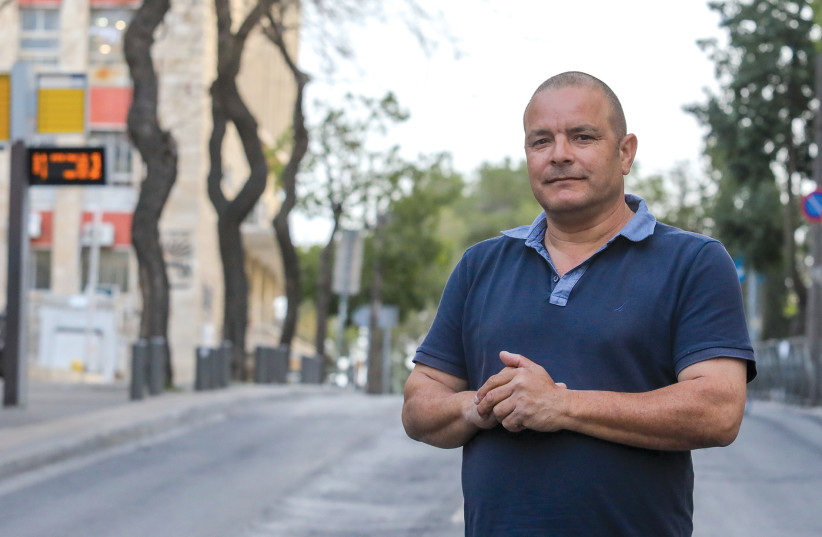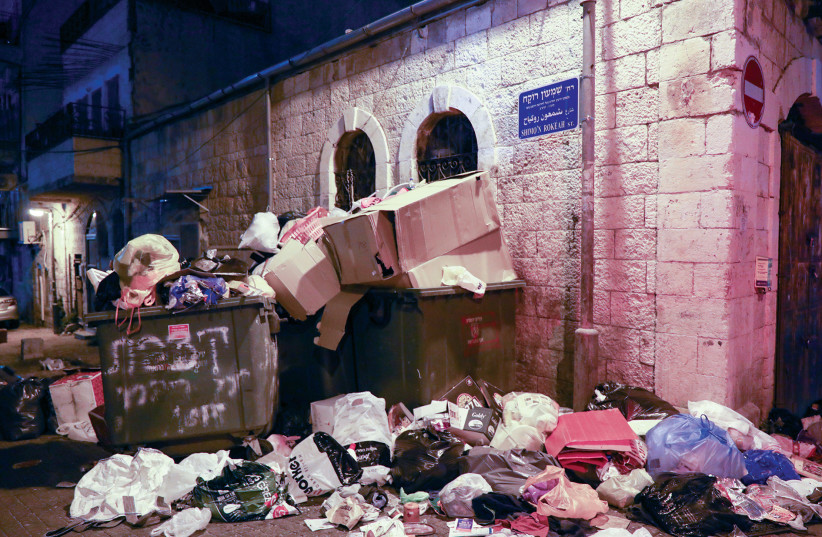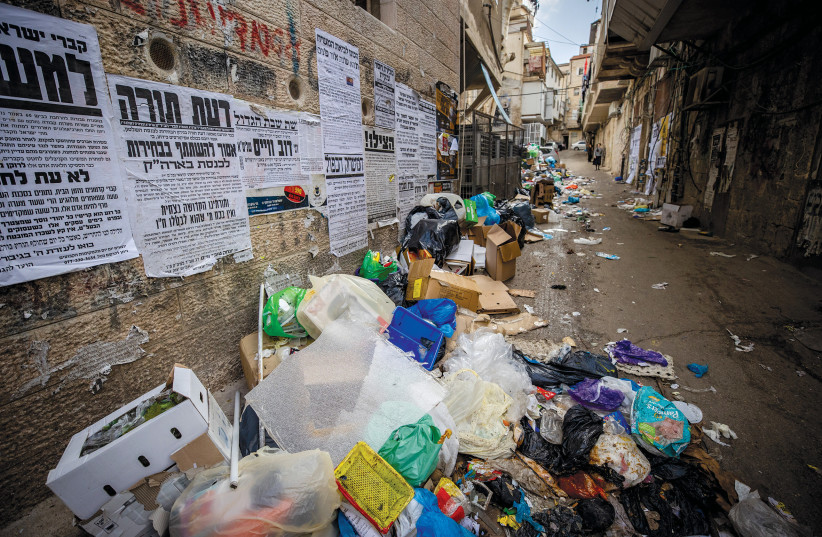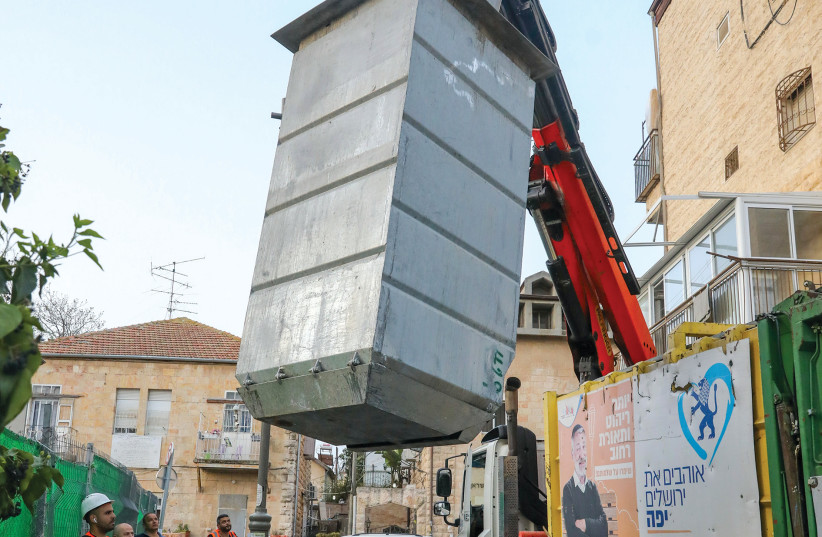Four in the morning, at the Banks Junction, photographer Marc Israel Sellem and I are waiting for a taxi to take us to sanitation department headquarters in the city’s haredi neighborhoods.
Down Shamgar Street, just before the intersection with Yirmiyahu Street, on the right, there is a small and slightly hidden structure from the road: from here, garbage trucks, sweeping cars and cleaning staff in all the municipality’s sanitary vehicles leave every morning to fulfill a nearly impossible task: maintaining a city of about one million residents. It is a challenge, especially here in the densely populated ultra-Orthodox neighborhoods, to clean it and keep it clean – at least for a day, until the next shift the following morning.
Itzik Lihiani, director of sanitation services of this area of the city, welcomes us with a big smile and leads us into the small office, from where he and his team manage the daily cleaning operations.
By now it’s a little after 5 a.m. Some of the workers are already sitting in the yard of the building, sipping one of the many cups of black strong coffee they will drink during the morning, as they are slowly being joined by more workers. Some of them are already dressed in their work uniforms, while others wait for their teammates before going into the neighborhoods they serve.
The cleaning operations are divided into several types of cleaning agents. First of all come the big garbage dump trucks, those which often delay other vehicles on narrow streets. These do the first part of the cleaning – collecting the garbage from the large or medium bins scattered across Jerusalem. They are followed by small cleaning cars, specially equipped to reach every corner along the sidewalks, sweeping the streets. Then will come the vans, whose task is picking up scrap from the sidewalks. Last but not least, the vans equipped with powerful water hoses make an appearance, washing all the streets after the garbage trucks have passed through them. Another kind of team are those on the vans that are essentially assembled cranes, capable of lifting the buried bins, emptying their contents and returning them to the pit in which they are buried.

Lihiani says that in many areas the residents are happy about the option of buried bins, but admits that in very crowded neighborhoods such as those where haredim reside, even these bins do not always prevent garbage from gliding around.
FINAL CHECK before going out, as the last workers come into the office to get fully outfitted – thick gloves, white helmets, then all make sure they are wearing uniforms with illuminated stripes on them – and set off. Lihiani, who began this work 20 years ago as a garbage truck driver, follows the crews in his small car, constantly in touch with the teams in the field, updating them and getting updated on the situation on the ground.
On the wall inside the office, an eye-catching and framed sign, a mayoral award won by Lihiani’s district and his staff awarded by municipality CEO Itzik Lary, is the pride of the whole team. The signboard arrived the day before and congratulations on receiving the award are exchanged among the staff. Lihiani greets the workers, telling them the award belongs to them and that the distinction makes him proud of his team.
The majority of workers seem to be in their thirties, but Lihiani says most work until they reach retirement age. Those employed directly by the municipality make about NIS 7,500 to 8,000 a month, yet those employed through contractors get only minimum wage. Considering that this job requires employees to start their working day at 4:30 a.m. and spend hours dealing with garbage and filth, this is far from a rewarding wage.
The sense of belonging to the team is very strong among the employees, Lihiani tells us. Jews and Arabs work together with an impressive show of force and cooperation.
I ask him how the atmosphere is considering the security tensions we have been experiencing lately and Lihiani immediately replies, “None of this comes in here. The workers are very careful to keep politics and these matters outside; we are all very careful not to let it interfere with us. It’s like the medical staff in the city’s hospitals – Jews and Arabs work together and protect themselves from outside influences, so it is with us.”
IT’S ALREADY 5:30 a.m., it’s still dark, but Marc Israel Sellem and I get into Lihiani’s small car, and we begin to ride inside the haredi neighborhood and follow the crews. Seven neighborhoods are under Lihiani’s responsibility – Mea She’arim, Beit Israel, Musrara, Bukharim, Arazei Habira, Shmuel Hanavi and Mandelbaum.
We first reach the Beit Israel neighborhood, very close to Mea She’arim. As we first step inside the streets, we see mountains of rubbish crowding the bins and scattered around them. Lihiani clarifies that these bins were just emptied yesterday, after the third round of emptying and cleaning, but just a few hours later, they have already been filled, as well as the streets, some of which are dirty; they also had been cleaned only a few hours before.

The situation in the ultra-Orthodox neighborhoods creates a lot of difficulties. “These are neighborhoods with very high density, harsh conditions, most of them are very old constructions,” explains Lihiani, “but I must point out that there is also a problem of deep lack of awareness among the residents. Just yesterday, I came across a woman who swept her house and without thinking twice dumped the garbage out into the street. My team cleans endlessly, but it’s never over.”
We continue touring the narrow streets of the Beit Israel neighborhood and from there to Mea She’arim. There things also look bad. At almost every corner, you can see that the street and sidewalks have recently been cleaned and washed, while garbage bags or just scattered trash have been piled up on the clean areas. Lihiani explains that the day before the teams emptied tons of garbage and scrap as usual, cleaned the streets and washed them – and just one night later, it seems as if next to nothing had been done.
Almost everywhere, in between the junkyard, there is abandoned furniture, torn sofas and other objects that especially now, as Passover approaches, are abandoned outside. “I think the problem is that these are mostly populations of low socioeconomic status,” Lihiani continues. “When a washing machine breaks down, in most cases there is no money to buy a new machine.
“Then, there is assistance for that family – it is impossible to leave a family with 10 or more children without a washing machine. Then someone will donate a machine. But often, this machine is not working properly. It will stand outside on the sidewalk. Then they will bring another machine donated by someone else, and maybe it is also not working and so on – washing machines, refrigerators, all kinds of appliances. The amount of scrap that is here is inconceivable.”
DAWN BEGINS to break, and from the inner alleys of Mea She’arim and Beit Yisrael, haredi men emerge, easy to associate with the various neighborhoods factions by their dress, rushing to the synagogue for morning prayers. We pass buildings considered strongholds of various groups, most of which belong to the more extreme factions of area resident

Near the Third Wall street where Rabbi Eliezer Berland’s followers rule, the situation looks relatively better – at least there are not a lot of scraps scattered on the sidewalks. We continue into Mea She’arim, passing the house of Yoelish Kraus, considered the operations officer of the haredi community; there is a lot of general desolation and on all the houses’ walls are Palestinian flags. Lihiani says he ordered his crews to erase or paint over the flags in color – but they too, like the trash, regularly reappear.
As we continue inside the most narrow streets, we also see large piles of garbage, cartons, packaging of all kinds and organic materials, with even a stream of “garbage juice” soiling the ground.
To address the problem, there are several kinds of bins on display in all haredi neighborhoods. Some are very large and some are small, located in the narrow alleys into which the garbage truck cannot enter. There is no other option, so workers will simply march inside the alleys and carry the garbage in their hands toward the trucks. After every emptying of bins, the sanitary teams arrive and wash the entire area.
We could see workers collecting garbage scattered around the bins by hand and transferring it to a van that arrives after the truck, even if it was in relatively large streets – there is no other option facing the unbelievable amounts of garbage. The same goes for junk scattered around, followed by the small sweepers machines, equipped with powerful broom heads that clean the sidewalks and the street or alley, and finally the vans equipped with powerful water hoses will arrive and wash everything away, every morning, everywhere across the city.
Lihiani is constantly in touch with the teams. When he sees there is a lot of scrap in a certain place, he immediately calls one of the team leaders. More than once, he got out of the car and would pick up a broken stroller or the remains of an unidentified object himself and throw it into the van. Toward 7 a.m. things begin to look a little better, and the vans with water hoses have by now reached the Strauss area, cleaning along the street leading to Jaffa Road.
In order to understand what all this is about, Lihiani provides us with accurate data. “In the days before the holiday, like this week, we dispose of 50 tons of garbage every day.” Lihiani believes that even if the situation in other city neighborhoods is less challenging, there are still huge amounts of garbage that must be removed daily and the locales cleaned after evacuation, “so that at least for a few hours a day, the neighborhood will look clean.”
SINCE MAYOR Moshe Lion began his tenure three-and-a-half years ago, a major change has occurred in city sanitation services. Leon had pledged to clean up the city and thus far, has kept his commitment.
There is no doubt that the city is cleaner, thanks to the big budgets allocated for just that. Workers were added, modern and efficient equipment was introduced and awareness of the issue was increased, since the mayor does not give up and is very involved in the capital’s cleaning efforts. There has always been a special effort ahead of Passover and this year, it is clear that even more so since this is an important issue for the municipality.
Among other things, for the first time in Jerusalem’s history, a Saturday night shift of garbage removal was added, as well as teams of non-Jewish contractors cleaning the city’s main streets on Saturday mornings. Since they are not city employees and are not Jewish, haredi council members in Lion’s coalition did not object.
As for the situation in the haredi neighborhoods, Lihiani says that what is missing is enforcement and more inspectors to file reports. “Only if people have to pay fines for scattering rubbish or throwing it outside the bins shall we see some improvement.” There is a lack of awareness, he notes; it’s not that people do it on purpose, but they just are not used to paying attention to their environment. Hence fines and enforcement are the only solution.
In one of the alleys, we could see in the distance packages of posters with public proclamations lying on the floor, ready for a messenger to stick them on the walls. Given the issues in these neighborhoods, they probably include the usual admonishments against using the Internet and smartphones, warnings of removal of kashrut certification from particular restaurants or perhaps calling for proposed community services toward Passover.
Glancing at them, Lihiani mused, “We’ll pick them up as part of our next garbage collection.” ❖

The operation
Sanitation Division director Gil Gurney, in his post since 2019, has 1,050 municipal employees and approximately 1,300 outsourced employees. In 2018, cleaning reform transferred street drainage system operations to contractors.
Last year, the sanitary budget was about NIS 473 million. Today, the budget is about NIS 679 million.
The division works in full cooperation with municipal enforcement and the policing division, with fines for dumping waste issued thanks to this cooperation.
